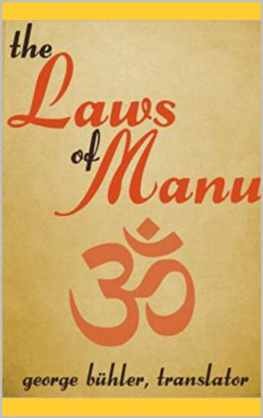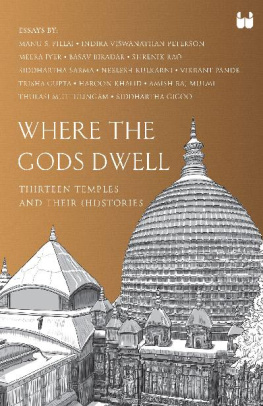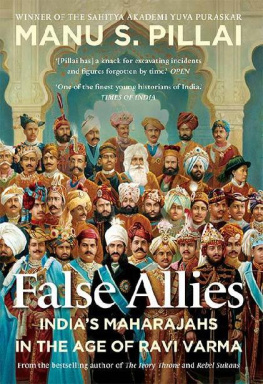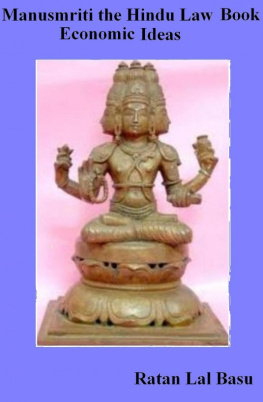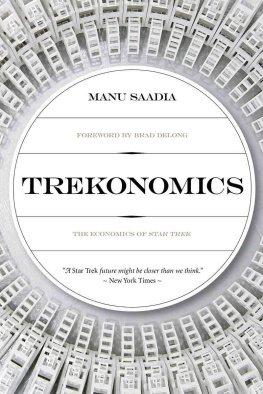George Buhler - Manusmriti - The Laws of Manu
Here you can read online George Buhler - Manusmriti - The Laws of Manu full text of the book (entire story) in english for free. Download pdf and epub, get meaning, cover and reviews about this ebook. year: 1896, genre: Science. Description of the work, (preface) as well as reviews are available. Best literature library LitArk.com created for fans of good reading and offers a wide selection of genres:
Romance novel
Science fiction
Adventure
Detective
Science
History
Home and family
Prose
Art
Politics
Computer
Non-fiction
Religion
Business
Children
Humor
Choose a favorite category and find really read worthwhile books. Enjoy immersion in the world of imagination, feel the emotions of the characters or learn something new for yourself, make an fascinating discovery.
- Book:Manusmriti - The Laws of Manu
- Author:
- Genre:
- Year:1896
- Rating:4 / 5
- Favourites:Add to favourites
- Your mark:
- 80
- 1
- 2
- 3
- 4
- 5
Manusmriti - The Laws of Manu: summary, description and annotation
We offer to read an annotation, description, summary or preface (depends on what the author of the book "Manusmriti - The Laws of Manu" wrote himself). If you haven't found the necessary information about the book — write in the comments, we will try to find it.
Manusmriti - The Laws of Manu — read online for free the complete book (whole text) full work
Below is the text of the book, divided by pages. System saving the place of the last page read, allows you to conveniently read the book "Manusmriti - The Laws of Manu" online for free, without having to search again every time where you left off. Put a bookmark, and you can go to the page where you finished reading at any time.
Font size:
Interval:
Bookmark:
1. The great sages approached Manu, who was seated with a collected mind, and, having duly worshipped him, spoke as follows:
2. 'Deign, divine one, to declare to us precisely and in due order the sacred laws of each of the (four chief) castes (varna) and of the intermediate ones.
3. 'For thou, O Lord, alone knowest the purport, (i.e.) the rites, and the knowledge of the soul, (taught) in this whole ordinance of the Self-existent (Svayambhu), which is unknowable and unfathomable.'
4. He, whose power is measureless, being thus asked by the high-minded great sages, duly honoured them, and answered, 'Listen!'
5. This (universe) existed in the shape of Darkness, unperceived, destitute of distinctive marks, unattainable by reasoning, unknowable, wholly immersed, as it were, in deep sleep.
6. Then the divine Self-existent (Svayambhu, himself) indiscernible, (but) making (all) this, the great elements and the rest, discernible, appeared with irresistible (creative) power, dispelling the darkness.
7. He who can be perceived by the internal organ (alone), who is subtile, indiscernible, and eternal, who contains all created beings and is inconceivable, shone forth of his own (will).
8. He, desiring to produce beings of many kinds from his own body, first with a thought created the waters, and placed his seed in them.
9. That (seed) became a golden egg, in brilliancy equal to the sun; in that (egg) he himself was born as Brahman, the progenitor of the whole world.
10. The waters are called narah, (for) the waters are, indeed, the offspring of Nara; as they were his first residence (ayana), he thence is named Narayana.
11. From that (first) cause, which is indiscernible, eternal, and both real and unreal, was produced that male (Purusha), who is famed in this world (under the appellation of) Brahman.
12. The divine one resided in that egg during a whole year, then he himself by his thought (alone) divided it into two halves;
13. And out of those two halves he formed heaven and earth, between them the middle sphere, the eight points of the horizon, and the eternal abode of the waters.
14. From himself (atmanah) he also drew forth the mind, which is both real and unreal, likewise from the mind egoism, which possesses the function of self-consciousness (and is) lordly;
15. Moreover, the great one, the soul, and all (products) affected by the three qualities, and, in their order, the five organs which perceive the objects of sensation.
16. But, joining minute particles even of those six, which possess measureless power, with particles of himself, he created all beings.
17. Because those six (kinds of) minute particles, which form the (creator's) frame, enter (a-sri) these (creatures), therefore the wise call his frame sarira, (the body.)
18. That the great elements enter, together with their functions and the mind, through its minute parts the framer of all beings, the imperishable one.
19. But from minute body (-framing) particles of these seven very powerful Purushas springs this (world), the perishable from the imperishable.
20. Among them each succeeding (element) acquires the quality of the preceding one, and whatever place (in the sequence) each of them occupies, even so many qualities it is declared to possess.
21. But in the beginning he assigned their several names, actions, and conditions to all (created beings), even according to the words of the Veda.
22. He, the Lord, also created the class of the gods, who are endowed with life, and whose nature is action; and the subtile class of the Sadhyas, and the eternal sacrifice.
23. But from fire, wind, and the sun he drew forth the threefold eternal Veda, called Rik, Yagus, and Saman, for the due performance of the sacrifice.
24. Time and the divisions of time, the lunar mansions and the planets, the rivers, the oceans, the mountains, plains, and uneven ground.
25. Austerity, speech, pleasure, desire, and anger, this whole creation he likewise produced, as he desired to call these beings into existence.
26. Moreover, in order to distinguish actions, he separated merit from demerit, and he caused the creatures to be affected by the pairs (of opposites), such as pain and pleasure.
27. But with the minute perishable particles of the five (elements) which have been mentioned, this whole (world) is framed in due order.
28. But to whatever course of action the Lord at first appointed each (kind of beings), that alone it has spontaneously adopted in each succeeding creation.
29. Whatever he assigned to each at the (first) creation, noxiousness or harmlessness, gentleness or ferocity, virtue or sin, truth or falsehood, that clung (afterwards) spontaneously to it.
30. As at the change of the seasons each season of its own accord assumes its distinctive marks, even so corporeal beings (resume in new births) their (appointed) course of action.
31. But for the sake of the prosperity of the worlds he caused the Brahmana, the Kshatriya, the Vaisya, and the Sudra to proceed from his mouth, his arms, his thighs, and his feet.
32. Dividing his own body, the Lord became half male and half female; with that (female) he produced Virag.
33. But know me, O most holy among the twice-born, to be the creator of this whole (world), whom that male, Virag, himself produced, having performed austerities.
34. Then I, desiring to produce created beings, performed very difficult austerities, and (thereby) called into existence ten great sages, lords of created beings,
35. Mariki, Atri, Angiras, Pulastya, Pulaha, Kratu, Praketas, Vasishtha, Bhrigu, and Narada.
36. They created seven other Manus possessing great brilliancy, gods and classes of gods and great sages of measureless power,
37. Yakshas (the servants of Kubera, the demons called) Rakshasas and Pisakas, Gandharvas (or musicians of the gods), Apsarases (the dancers of the gods), Asuras, (the snake-deities called) Nagas and Sarpas, (the bird-deities called) Suparnas and the several classes of the manes,
38. Lightnings, thunderbolts and clouds, imperfect (rohita) and perfect rainbows, falling meteors, supernatural noises, comets, and heavenly lights of many kinds,
39 (Horse-faced) Kinnaras, monkeys, fishes, birds of many kinds, cattle, deer, men, and carnivorous beasts with two rows of teeth,
40. Small and large worms and beetles, moths, lice, flies, bugs, all stinging and biting insects and the several kinds of immovable things.
41. Thus was this whole (creation), both the immovable and the movable, produced by those high-minded ones by means of austerities and at my command, (each being) according to (the results of) its actions.
42. But whatever act is stated (to belong) to (each of) those creatures here below, that I will truly declare to you, as well as their order in respect to birth.
43. Cattle, deer, carnivorous beasts with two rows of teeth, Rakshasas, Pisakas, and men are born from the womb.
44. From eggs are born birds, snakes, crocodiles, fishes, tortoises, as well as similar terrestrial and aquatic (animals).
45. From hot moisture spring stinging and biting insects, lice, flies, bugs, and all other (creatures) of that kind which are produced by heat.
46. All plants, propagated by seed or by slips, grow from shoots; annual plants (are those) which, bearing many flowers and fruits, perish after the ripening of their fruit;
47. (Those trees) which bear fruit without flowers are called vanaspati (lords of the forest); but those which bear both flowers and fruit are called vriksha.
48. But the various plants with many stalks, growing from one or several roots, the different kinds of grasses, the climbing plants and the creepers spring all from seed or from slips.
Font size:
Interval:
Bookmark:
Similar books «Manusmriti - The Laws of Manu»
Look at similar books to Manusmriti - The Laws of Manu. We have selected literature similar in name and meaning in the hope of providing readers with more options to find new, interesting, not yet read works.
Discussion, reviews of the book Manusmriti - The Laws of Manu and just readers' own opinions. Leave your comments, write what you think about the work, its meaning or the main characters. Specify what exactly you liked and what you didn't like, and why you think so.

